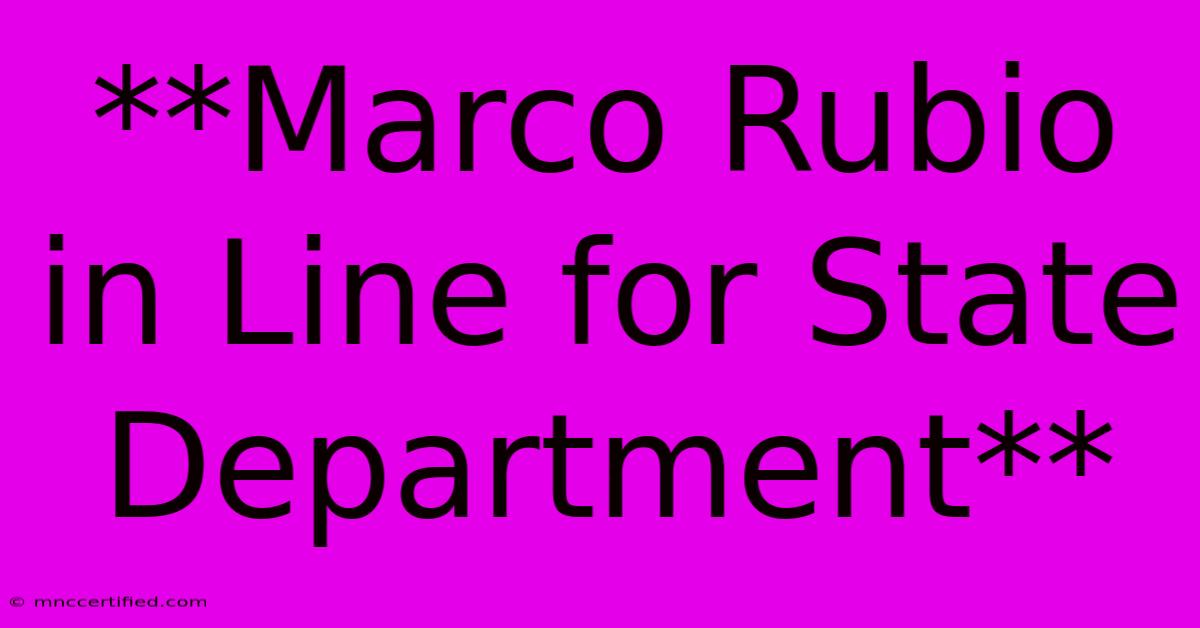**Marco Rubio In Line For State Department**

Table of Contents
Marco Rubio in Line for State Department: A Look at the Potential Appointment and its Implications
Senator Marco Rubio, a prominent Republican figure from Florida, has been rumored to be a potential candidate for the position of Secretary of State under the Biden administration. This news has sparked significant debate and analysis, considering Rubio's political stance and past statements. This article delves into the potential implications of such an appointment and explores the factors that might influence the decision.
Rubio's Background and Stance: A Look at the Contender
Marco Rubio, known for his strong conservative viewpoints, has served in the U.S. Senate since 2011. His political career has been characterized by his focus on issues like national security, immigration reform, and trade policy. He has been a vocal critic of the Biden administration's foreign policy, particularly concerning China and Venezuela.
Rubio's potential appointment has raised eyebrows due to his past criticisms of the Biden administration. His stance on issues like Cuba and Venezuela, his support for a more assertive approach towards China, and his general skepticism of multilateralism, might clash with the Biden administration's foreign policy priorities. This potential for conflict has fueled speculation about the viability of Rubio's candidacy.
Potential Implications of Rubio's Appointment
If appointed, Rubio's presence at the State Department would represent a significant shift in the administration's foreign policy approach. His influence could potentially lead to a more hawkish stance towards China and Venezuela, aligning with the Republican Party's recent focus on these issues.
However, the appointment might also face internal resistance within the Democratic Party. The potential for friction between Rubio's conservative viewpoints and the Biden administration's priorities could create a challenging dynamic within the State Department, potentially impacting the smooth execution of foreign policy initiatives.
Key Factors Influencing the Decision
The decision to appoint Marco Rubio as Secretary of State will be influenced by several key factors:
- Biden's Desire for Bipartisan Support: The Biden administration might be seeking to demonstrate a commitment to bipartisanship, particularly in the face of ongoing political polarization. Rubio's appointment could signal a willingness to reach across the aisle, although this could also be seen as a strategic move to appease the Republican party.
- The Need for Experienced Leadership: Rubio's experience in the Senate and his understanding of international relations could be valuable assets in the role of Secretary of State. However, his lack of experience in the executive branch, particularly in the realm of diplomacy, might raise concerns.
- The Political Climate: The appointment of Marco Rubio would likely be met with intense scrutiny and criticism from both sides of the political spectrum. The political landscape and the potential for backlash from both Republicans and Democrats will be crucial considerations for the Biden administration.
Conclusion: A Moment of Uncertainty
The possibility of Marco Rubio's appointment as Secretary of State presents a significant moment of uncertainty in the Biden administration's foreign policy. His appointment could potentially signify a shift towards a more conservative and assertive approach to global affairs, particularly on issues like China and Venezuela. However, it also raises questions about the potential for internal conflict and the challenges of navigating a highly polarized political environment.
Only time will tell whether the Biden administration will ultimately choose to appoint Marco Rubio to this critical role. The decision will undoubtedly have significant implications for the future direction of U.S. foreign policy.
This article has discussed the potential appointment of Marco Rubio to the State Department, highlighting his background, the possible implications, and the key factors influencing the decision. It is important to note that this is an evolving situation, and further developments and analysis are likely to emerge.

Thank you for visiting our website wich cover about **Marco Rubio In Line For State Department**. We hope the information provided has been useful to you. Feel free to contact us if you have any questions or need further assistance. See you next time and dont miss to bookmark.
Featured Posts
-
Skai Jackson Pregnant My Heart Is Full
Nov 13, 2024
-
Trump Nominates Vivek Ramaswamy Background
Nov 13, 2024
-
British Mum Reports Intruder At Turkish Hotel
Nov 13, 2024
-
Atlanta Showdown 4 Takeaways From Dukes Victory
Nov 13, 2024
-
Can I Insure A Car In Another State
Nov 13, 2024